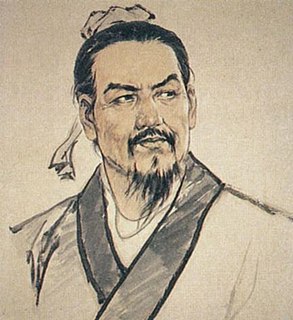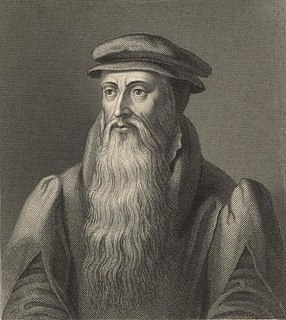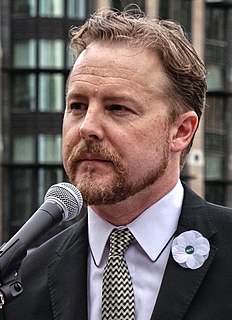A Quote by Joseph Smith, Jr.
[God] never will institute an ordinance or give a commandment to His people that is not calculated in its nature to promote that happiness which He has designed, and which will not end in the greatest amount of good and glory to those who become the recipients of His law and ordinances.
Related Quotes
God has created all things for good; all things for their greatest good; everything for its own good. What is the good of one is not the good of another; what makes one man happy would make another unhappy. God has determined, unless I interfere with His plan, that I should reach that which will be my greatest happiness. He looks on me individually, He calls me by my name, He knows what I can do, what I can best be, what is my greatest happiness, and He means to give it me.
In all His acts God orders all things, whether good or evil, for the good of those who know Him and seek Him and who strive to bring their own freedom under obedience to His divine purpose. All that is done by the will of God in secret is done for His glory and for the good of those whom He has chosen to share in His glory.
Once we agree with God that we exist for His pleasure and His glory, we can accept whatever comes into our lives as a part of His sovereign will and purpose. We will not resent, resist, or reject the hard things, but embrace them as friends, sovereignly designed by God to make us more like Jesus and to bring glory to Himself.
Upon this point all speculative politicians will agree, that the happiness of society is the end of government, as all divines and moral philosophers will agree that the happiness of the individual is the end of man. From this principle it will follow that the form of government which communicates ease, comfort, security, or, in one word, happiness, to the greatest numbers of persons, and in the greatest degree, is the best. All sober inquirers after truth, ancient and modern, pagan and Christian, have declared that the happiness of man, as well as his dignity, consists in virtue.
We now possess four principles of morality: 1) a philosophical: do good for its own sake, out of respect for the law; 2) a religious: do good because it is God's will, out of love of God; 3) a human: do good because it will promote your happiness, out of self-love; 4) a political: do good because it will promote the welfare of the society of which you are a part, out of love of society having regard to yourself. But is this not all one single principle, only viewed from different sides?
It is the grandeur of Christ's character which constitutes the chief power of His ministry, not His miracles or teachings apart from His character. The greatest triumph of the Gospel is Christ Himself--a human body become the organ of the Divine nature, and revealing, under the conditions of an earthly life, the glory of God.
Love is the greatest thing that God can give us; for Himself is love: and it is the greatest thing we can give to God; for it will also give ourselves, and carry with it all that is ours. The apostle calls it the band of perfection; it is the old, and it is the new, and it is the great commandment, and it is all the commandments; for it is the fulfilling of the Law.
Those who shine with the glory of God are destined to become walking spiritual experiences for others. Those who covet being in His presence, soak in His love, quiet their souls and allow the Lord to change them, become transformed and grow from glory to glory. They become the ones who step up during such a time as this.
God the Eternal Father did not give [the] first great commandment because He needs us to love Him. His power and glory are not diminished should we disregard, deny, or even defile His name. His influence and dominion extend through time and space independent of our acceptance, approval, or admiration."No, God does not need us to love Him. But oh, how we need to love God!"For what we love determines what we seek."What we seek determines what we think and do."What we think and do determines who we are—and who we will become.
The artist of the future will live the ordinary life of a human being, earning his living by some kind of labour. He will strive to give the fruit of that supreme spiritual force which passes through him to the greatest number of people, because this conveying of the feelings that have been born in him to the greatest number of people is his joy and his reward. The artist of the future will not even understand how it is possible for an artist, whose joy consists in the widest dissemination of his works, to give these works only in exchange for a certain payment.
It is our duty to endeavor always to promote the general good; to do to all as we would be willing to be done by were we in their circumstances; to do justly, to love mercy, and to walk humbly before God. These are some of the laws of nature which every man in the world is bound to observe, and which whoever violates exposes himself to the resentment of mankind, the lashes of his own conscience, and the judgment of Heaven. This plainly shows that the highest state of liberty subjects us to the law of nature and the government of God.
Now although man is created for the possession of happiness, yet, having deviated from his true end, his nature has become deformed and is entirely repugnant to true beatitude. And on this account we are forced to submit to God this depraved nature of ours which fills our understanding with so many occupations, and causes us to deviate from the true path, in order that he may entirely consume it until nothing remains there but himself; otherwise the soul could never attain stability nor repose, for she was created for no other end.






































